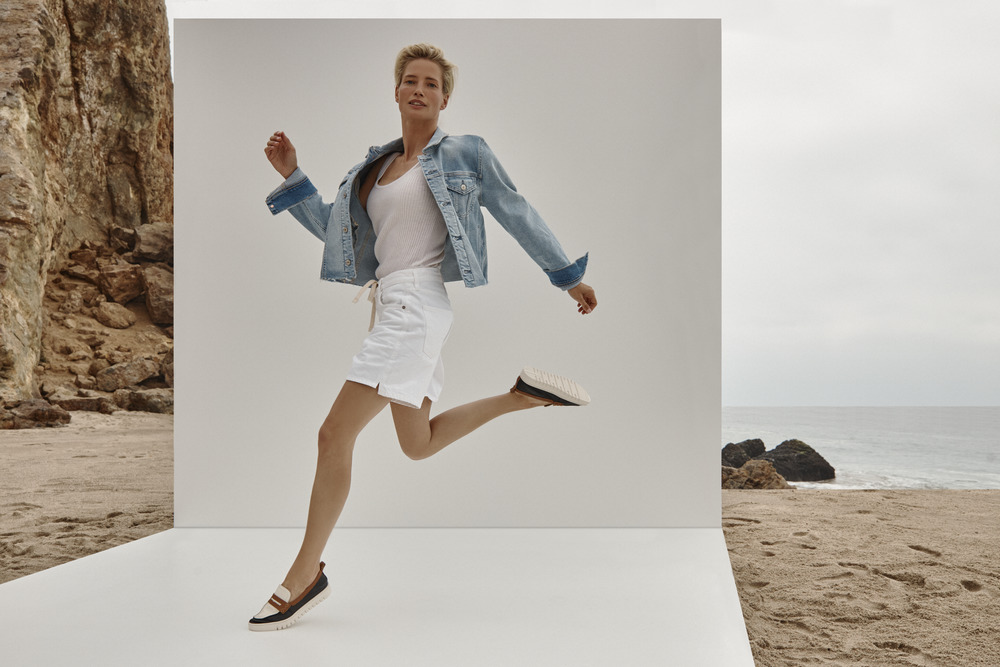
written by Dr. Jacqueline Sutera, DPM and Vionic Innovation Lab Member
Wearing the right shoe for your foot type and foot shape can prevent common foot problems like heel pain, arch discomfort, and sore feet while promoting healthy feet for the long term. Whether you’re choosing a stability shoe for walking or the best running shoes for your morning jog, selecting supportive footwear with proper cushioning and arch support is essential.
Staying active is not only good for your physical body – to stay in shape and have a healthy immune system – but also for your emotional and mental wellbeing. At Vionic, we believe that shoes and foot health are closely related and it’s a number one priority for us to help you maintain your foot health with supportive footwear. From wearing comfortable stylish shoes with arch support to avoiding barefoot activities, here are our top tips and expert advice regarding shoes that are good for your feet and overall foot health.
Wear Appropriate Shoes for Any Activity
A lot of technology goes into comfortable shoes. For example, running and walking shoes are made for forward motion while basketball and tennis are made for lateral/side to side motion. Make sure to choose your styles accordingly!
Replace any old and worn-out shoes. How long do walking shoes really last exactly? The general rule of thumb is to replace your shoes every 8-10 months but you might need to do so sooner if you are particularly hard on your shoes. However, warm weather shoes – such as comfortable flip-flops – might need to be replaced after only one or two seasons if they are not worn year-round.
A good way to measure whether your shoes are worn out is to run the “tabletop test.” To do this, put your shoes at eye level on your tabletop and examine the symmetry and integrity. Are they even? Are they worn? Then flip them upside down and examine the tread. Is it smooth? Does it have holes?! If so, resole or better yet – replace your walking shoe with a new pair!
Old and worn-out shoes can hurt your feet and overall skeleton. Any shoe with worn-out soles force your foot to land at an increased angle. This can stress out bones, muscles, ligaments and tendons and can cause sprains, fractures, strains, inflammation and injury. Old shoes might feel good because they are broken in and comfortable, just like junk food might taste good, but it is not good for you.
Avoid Walking Barefoot Around the House
It can be very tempting, especially in the summertime, to be barefoot or live in flip flops. But avoid being barefoot on hard surfaces for long periods of time. Use a supportive shoe or sandals with arch support, cushioning and shock absorption, and limit use of high heels and very flat or thin types of sandals and flip flops.
It is important to make sure your shoes fit correctly. Choose styles that fit you correctly. You want to wear shoes that will accommodate your specific needs, especially if you have a wider foot, bone spur, hammertoe, or bunion. Avoid buying shoes that are not quite right just because they are on sale or because you like the style! Don’t wear hand-me-down shoes or purchase any second-hand shoes. These have wear patterns from the previous person and can cause injury. Plus, there is also hygiene concern when looking at the effects of wearing hand-me-down shoes. However, you can opt for Vionic shoes to have comfort, style, and quality all in one without compromising your foot health. Check out our women’s shoes on sale to see if any of your favorite styles are featured!
Hard Surfaces are Harsh on the Feet
When walking on hardwood, cement, stone, or ceramic tile, there is really nothing to absorb the shock between you and the ground. Over time, this behavior can contribute to deterioration to your fat pad, which serves as the foot’s natural cushion. Women should be especially cognizant of fat pad atrophy, as they’re more likely to develop it due to hormone changes. Limit your barefoot time to carpet or cork flooring only, and wear comfortable, supportive footwear when on harder indoor surfaces. My at-home go-to: Gemma II Mule Slippers. Wearing slippers at home is great for your feet as these supportive slippers are plush and provide comfortable arch support as you walk around your house.
Being barefoot at home for long periods of time can lead to foot pain, especially during pregnancy when feet tend to spread and widen. Closed supportive slippers with extra cushioning, shock absorption and good arch support are your best bet, especially if you have flat feet.
Walking barefoot can cause degeneration of the natural cushion and fat pad on the bottom of the foot. Without this fat, you are literally walking or running on skin and bone. Once this fat pad degenerates it’s gone forever. Protect it by wearing well-padded shoes and supportive slippers while at home, like those made by Vionic with built-in arch support and cushion. Think of time at home, or when not working out as “active recovery.” Make foot loving choices and choose proper footwear that supports your feet!
Alternate Between Comfortable Footwear
Alternate shoe gear throughout the day and week. The repetitive stress of walking and wearing the same shoes every day, all day, can inflame ligaments, tendons and fascia and even cause pain, injury and stress fractures. Wearing the same style shoe in different colors is just as bad! They should be different styles and types of shoes. Try switching from slippers during early morning and late evening hours, and alternate between essential everyday shoes and casual sneakers like the Bella and Willa for everyday wear, or the more supportive 23Walk 2.0 for women. For work or outings, the Uptown Loafer or Winny styles provide both comfort and sophistication. If you’re looking to dress warm in winter, our heeled booties also provide superior arch support to keep your feet protected and comfortable all winter long.
When it comes to men’s styles, opt for the comfortable 23Walk 2.0 for supportive, all-day wear or the Tide II sandals for a laid-back, breathable option during warmer weather—no matter the style, we’ve got you covered with Vionic’s Three-Zone Comfort technology for ultimate arch support.
How to Find The Best Shoes for Feet Health:
- Heel Test – Push the heel of the shoe toward the inside of the shoe. If the heel is easy to push down it won’t provide good support for your heel. The best shoes will have a sturdy heel to support the entire foot and ankle.
- Toe Test – Push the toe of the shoe up to try to bend the front of the shoe up. If the shoe is easy to bend it will not provide good support. The best shoes will have very little bend except for the ball of the foot.
- Twist Test – Hold the shoe in both hands with one hand gripping the heel and one hand gripping the bottom of the front of the shoe. Twist the heel in one direction while twisting the front of the shoe in the opposite direction. The best shoes will be difficult to twist. If the shoe is easy to twist it will not provide good support.
Foot Pain Treatment and Prevention:
- Avoid being barefoot, wear supportive shoes, avoid thin, flat, old and worn-out shoes.
- Calf stretches in the morning and after long periods of rest are very important in prevention of plantar fasciitis. Keeping the Achilles loose and limber and stretched so it doesn’t tighten up is paramount. If the Achilles tendon is tight, the plantar fascia will become tight and inflamed.
- Massaging the calf and arch can also provide relief as well as prevent fasciitis. An easy way to incorporate this is after bath or shower when applying body moisturizer. Apply a bit more pressure when going over your legs, calves and arches. Use your knuckles to get into the fleshy part of your calf for a deeper, daily massage and use the “tick tack toe” cross fiber technique in your arch. Massage lengthwise as well as across your entire foot arches. This does a really great job of fascial release and prevention of fasciitis.
To find shoes that are good for your feet that you can wear around the house, browse the Vionic collection of supportive heels or wedges, recovery shoes, and many other styles!


Janet Stanton
I wear a 5.5, not a 6. I can wear a 5 in a sandal, but not in a closed shoe. I have a 5 that rub blisters every time I try to wear them (Even with band-aids.) I bought a 6 and the heel moves up and down. Your shoes are just too expensive for me to experiment with sizes.
Vionic Shoes
Hi Janet! We’re sorry to hear this. We currently offer women’s whole sizes 5-12 and half sizes 6.5-10.5. You can always refine your search online by size, width and color.
Debbie
What shoe is best to wear if you have nuropathy in feet?
Vionic Shoes
Thanks for reaching out! We always recommend consulting with a podiatrist as they can best assess your health needs and recommend a footwear brand that will offer options to best suit your needs. Our shoes and sandals were designed to hug your arches like a natural footprint, giving you all-day support. You can find more information on our Vio-Motion Support here: https://www.vionicshoes.com/vio-motion-support
Linda
i have very bad planter fascia in both feet and have a torn fascia in one foot which I tore 2 years ago and still hasn’t healed I’m also a cashier at a grocery store what shoes would you wear ? I do have your slippers but they don’t fit well . Not sure what I should be wearing while at work can you please give some kind of idea which I should be wearing . I have spent way to much money on shoes the past two years . Thank you
Vionic Shoes
Hi Linda! You might be interested in our Vionic Pro line, which features slip-resistant soles and technical uppers. We also offer a 30-day wear test with each pair of shoes purchased from our website so you can shop with confidence – https://www.vionicshoes.com/30-day-guarantee
JIll Evans
Can my 12 yr old daughter wear Vionic?
Vionic Shoes
We currently offer women’s whole sizes 5-12 and half sizes 6.5-10.5.
Aliya
great